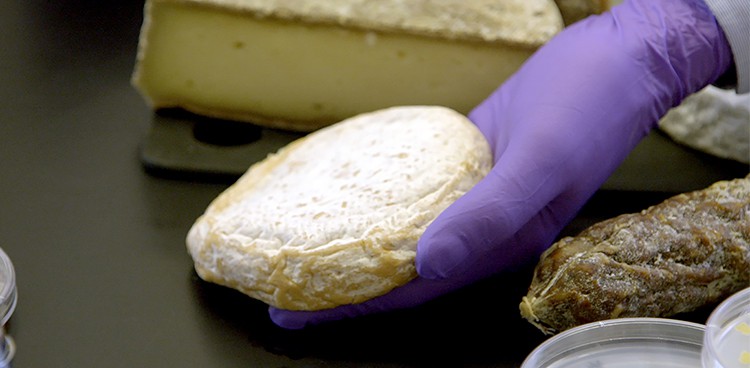
I was ecstatic when I heard that an episode of Netflix’s new foodie series, Cooked, focuses a lot on cheese. Unfortunately, the cheese episode is the last one, so my boyfriend and I were “forced” to watch three episodes the other night. The episode, entitled “Earth,” looks at fermentation as a whole, but if you want to refrain from binging the whole series, or if watching people drink beer sounds a little boring, or if, like me, you are unnerved by the idea of kimchi, scroll on down and read about the best, cheesiest bits!
Years ago when doing research for the original book Cooked, food activist Michael Pollan sought out the Abbey of Regina Laudis. At this beautiful Abbey in Bethlehem, Conn., Sister Noella Marcellino—nicknamed “The Cheese Nun”, armed with doctorates in microbiology (and her faith)—makes the award-winning Bethlehem Cheese. The sisters have been making this cheese for decades, and the story she tells about the cheese’s origin at the Abbey is enthralling: Sister Noella had just been praying for an old French woman to come to the Abbey to teach them how to make cheese, when two days later a young French woman with cheese knowledge happened to show up and transmit a cheese recipe that had been handed down to her from her grandmother!
Another amazing story [SPOILER ALERT] involves Sister Noella and the Health Department. In the late ’80s the Health Department shut down cheese production at the Abbey after they visited and discovered that wooden barrels—per the French cheese woman’s instructions—were used to make Bethehem Cheese. The Health Department said that if Sister Noella used a steel barrel, then they could make their cheese. So, they did. And immediately the cheese started getting E. Coli. Sister Noella invited a representative from the Health Department to witness her project for her microbiology degree program. The Sister took fresh milk from a cow and split the amount in half. One went into a steel container and the other in a wooden barrel. In the resulting cheese, the E. Coli went down in the wooden barrel but it increased in the stainless steel vat. Sister Noella was able to prove that the wooden barrels’ natural bacteria ate the E. Coli and produced a better cheese, and the Health Department apologized.
These stories are intriguing enough, but so are the visuals Sister Noella presents. She shows the growth of bacteria over a period of several days to the audience, from under a microscope. It’s strange to realize that such a wondrous thing as cheese is really decomposing matter. As Sister Noella and Pollan poetically point out, decomposition and cheese is a promise of something better between life and death.
The other great cheesy feature in the episode is when Pollan unearths another angle to science and cheese during a visit to microbiologist Benjamin Wolfe at Tufts University in Boston. Wolfe is studying the microbes found on cheese to understand how types of bacteria affect the body; while he isn’t close to fully understanding it, he does help cheesemakers understand why some of their cheeses don’t taste good and advise the FDA when making cheese regulations.

Photo Credit: Kelvin Ma/Tufts University
Out of the whole series, “Earth” was my favorite episode. In the other episodes, Pollan speaks passionately about food processing and production issues and the inaccessibility of healthy food, which, while important, can be a downer. But don’t worry: if you’re watching Cooked and feel powerless and furious, the last episode is a relaxing and enticing foray into the possibilities of cheese.
Feature Photo Credit: Netflix




